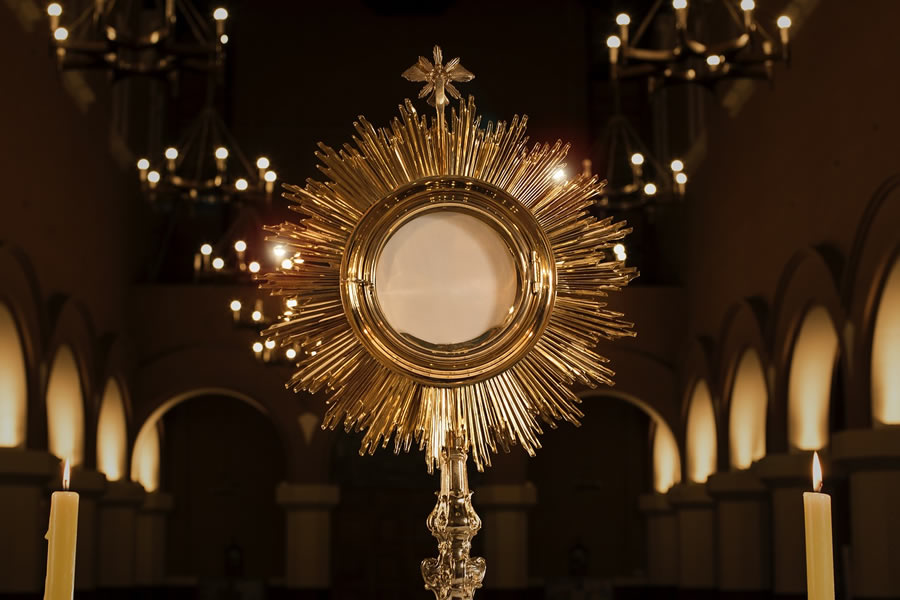
Pope St. Pius X ”Pope of the Blessed Sacrament”
08-20-2023Weekly ReflectionSister Timothy Marie, , O.C.D. Carmelite Sisters of the Most Sacred Heart of Los AngelesBishop, Patriarch of Venice, Cardinal, Pope and Patron of Pilgrims Feast Day: August 21
Pope St. Pius X is currently the only canonized saint who belonged to the Order of the Holy Sepulchre. He was Grand Master. In his apostolic Letter “Quam Multa” dated October 13, 1908, he consolidated the position of the Order in the Holy Land and reserved for himself and his successors the office of Grand Master. He gave the Knights a place in the papal chapels and appointed the Latin Patriarch to be Rector and Perpetual Administrator of the Order.
Giuseppe Sarto, the future Pope Pius X, was born on June 2, 1835, in the town of Riese, Venetia, Austrian Empire [which became Italy] and grew up in a poor family. He was the second of 10 children, and his parents nicknamed him “Bepi.” Despite the family’s poverty, his parents valued education and through hard work, he was able to obtain a scholarship to the seminary in Padua. On September 18, 1853, he was ordained and became a parish priest in the Italian region of Venetia where he served many years. In 1893, he became the cardinal and patriarch of Venice. Subsequently, after the death of Leo XIII, he was elected pope at 68 years of age and took the name of Pius X and his papal motto “to restore all things in Christ.”
Pope St. Pius X declared war on the heresy of Modernism in his encyclical, “Feeding the Lord’s Flock.” In the third paragraph, he writes that the Modernists “lay the ax not to the branches and shoots, but to the very root, that is, to the faith and its deepest fibers.” With the encyclical, he included a compulsory oath for all Catholic bishops, priests and teachers to reject Modernism and accept the magisterium of the Catholic Church. St. Pius X reformed seminaries by bringing back the study of St. Thomas Aquinas which emphasizes the joining of reason and revelation in scholasticism, the system of theology and philosophy based on Aristotelian logic and the writings of the early Church Fathers with a strong emphasis on tradition and dogma. He initiated what would become known as the “liturgical movement” with his 1903 document on sacred music which reformed and renewed sacred music. In it, he restated principles and standards handed down from the elders and wisely brought them together as the conditions of modern times demanded. Most notably, he earned the name “Pope of the Blessed Sacrament” for his reforms regarding the reception of Holy Communion which allowed children to receive their First Communion at age seven and for Catholics to receive Holy Communion weekly. Along with these reforms, he fought for the rights of the Catholic Church in modern society.
On the 11th anniversary of his election as pope, Europe was plunged into World War I. He had foreseen the coming war and had said, “This is the last affliction the Lord will visit on me. I would gladly give my life to save my poor children from this ghastly scourge.” He died just few weeks after the war began. His last will and testament bears this striking sentence: “I was born poor, I have lived in poverty, and I wish to die poor.” He died on August 20, 1914, and was canonized in 1954. His feast day is celebrated on August 21. He was one of the 20th century’s greatest popes.
Quotes by Pope St. Pius X
“If the Angels could envy us, they would envy us for Holy Communion”
“Holy Communion is the shortest and safest way to Heaven.”
“Once for all beloved children, the surest, easiest, shortest way is by the Eucharist."
It is so easy to approach the holy table, and there we taste the joys of Paradise.”
BACK TO LIST